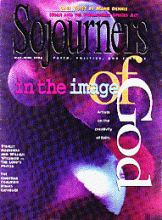THE TASK of the novelist is to give the devil his due. I will leave it to the saints to manifest God's presence in their words and deeds. That is the art of saints.
Writers are contemplatives. Daily we give ourselves over to silence, only to find the world at its worst marching across the snowy horizon of the page. The characters one had such hope for turn out to be, well, human. They hate, manipulate, seduce other people's spouses. They love money, worry about their looks, and fume about the state of the nation while making no effort to change things.
This is not to say that grace does not happen in their lives: instances of beauty and truth, wee epiphanies that unleash longings to live for...something more, something the world's religions have named variously as compassion, agape, wakefulness, tikkun, the repair of the earth. But all it takes is one bad traffic jam, one bad hair day, and my characters-those mirrors of my own heart-forget, entering once again into what Buddhism calls maya, illusion: what Christians call sin.
Still, the novelist hopes. We watch our characters without judgment, embracing equally what is lovely and sinister. We hope that in the end our characters will learn something about life and love-that is, if the darkness they court does not swallow them up first.
At times we try to push our creations toward safety and right action. But souls, even fictional ones, are not so easily manipulated. Like a parent, the novelist must eventually get out of the way so that our characters may become their own persons, enter into their own pacts with God and the devil. Book after book, our characters teach us that few people are wholly good or wholly evil. The writer who cannot love the color gray, who cannot embrace a world that is less than black and white, will not last long. Our creations will die for lack of compassion if we replace truth-telling with moralizing.
Read the Full Article

